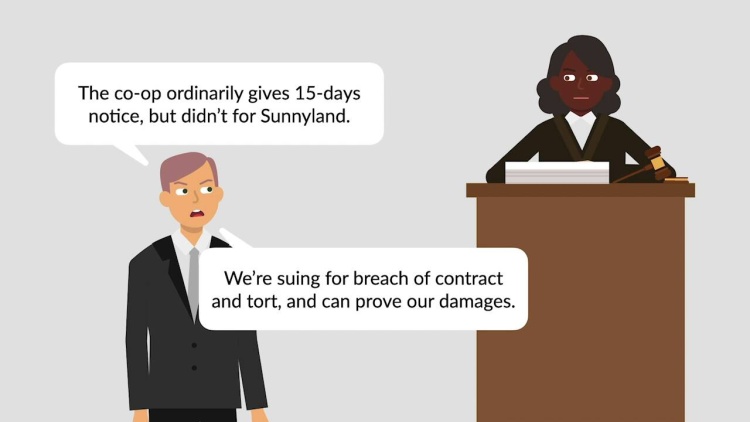Sunnyland Farms, Inc. v. Central New Mexico Electrical Cooperative, Inc.
New Mexico Supreme Court
301 P.3d 387 (2013)

- Written by Sean Carroll, JD
Facts
Central New Mexico Electrical Cooperative, Inc. (CNMEC) (defendant) shut off Sunnyland Farms, Inc.’s (plaintiff) electricity for nonpayment. The next day a fire broke out at Sunnyland’s facility as a result of Sunnyland employees’ negligence. Sunnyland’s water pumps could not operate without electricity. The fire destroyed the facility. Sunnyland brought suit against CNMEC in contract and tort, alleging that CNMEC should not have shut off the electricity because CNMEC did not provide proper notice of the impending shutoff. Sunnyland claimed that this error caused the complete destruction of the facility. The trial court found in favor of Sunnyland on both the contract and tort claims. A Sunnyland expert witness provided an estimate as to how much Sunnyland lost in profits due to the fire. Based on this testimony, the trial court calculated over $21 million in consequential damages, including the value of the crops that Sunnyland would have been able to grow at the facility. The trial court reduced that amount in the tort claim by 80 percent to account for Sunnyland’s negligence. The trial court permitted Sunnyland to elect its remedy in either contract or tort. The court of appeals reversed on the issue of damages, finding that Sunnyland was not entitled to consequential damages in contract and that the damages in tort as calculated were not reasonably certain. Sunnyland appealed.
Rule of Law
Issue
Holding and Reasoning (Chavez, J.)
What to do next…
Here's why 908,000 law students have relied on our case briefs:
- Written by law professors and practitioners, not other law students. 47,100 briefs, keyed to 997 casebooks. Top-notch customer support.
- The right amount of information, includes the facts, issues, rule of law, holding and reasoning, and any concurrences and dissents.
- Access in your classes, works on your mobile and tablet. Massive library of related video lessons and high quality multiple-choice questions.
- Easy to use, uniform format for every case brief. Written in plain English, not in legalese. Our briefs summarize and simplify; they don’t just repeat the court’s language.





